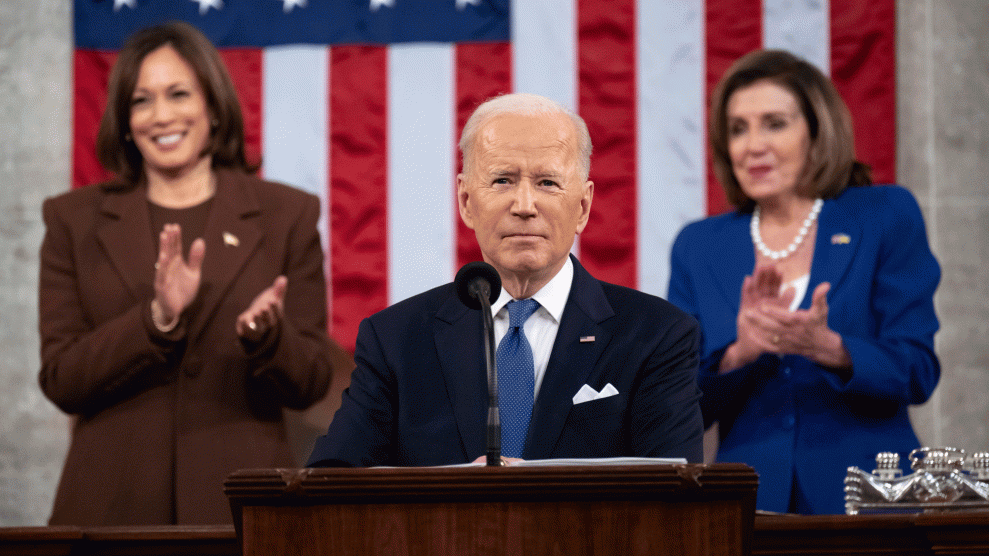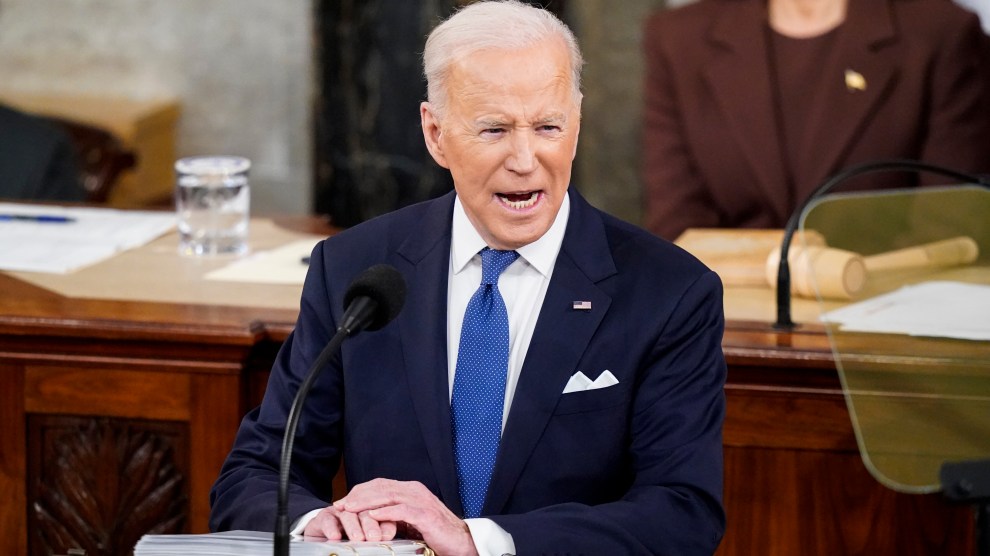
President Joe Biden delivers his first State of the Union address to a joint session of Congress at the Capitol, as Vice President Kamala Harris and House Speaker Nancy Pelosi watch.Saul Loeb/AP
You can often judge a person by his or her friends. And you can judge a politician by his or her enemies. During his first State of the Union speech on Tuesday evening, President Joe Biden fired rhetorical shots at a number of targets, and the domestic portion of that list underscores the progressive populist agenda he’s endeavoring to pursue.
At the top of Biden’s most-wanted list, naturally, was Russian leader Vladimir Putin. He assailed the war crime-ordering Putin as a “menacing” “dictator” and pledged support to the Ukrainians resisting Moscow’s “premeditated and totally unprovoked” attack. Biden also zeroed in on “Russian oligarchs and the corrupt leaders who bilked billions of dollars off this violent regime,” and announced that the Department of Justice “is assembling a dedicated task force to go after the crimes of the Russian oligarchs.” In an unprecedented blast at Putin’s billionaires, the president warned them that the US and European governments will “find and seize their yachts, their luxury apartments, their private jets. We are coming for your ill-begotten gains.”
Flaying Putin and his cronies was no surprise—though it was certainly a change from Donald Trump’s approach toward the Butcher of Moscow and his kleptocratic comrades—but in other passages of the address, Biden was sharp in identifying malevolent forces that are causing harm and fueling inequity within the United States.
Pointing to Joshua Davis, a 13-year-old from Virginia who has Type I diabetes and who was sitting with First Lady Jill Biden, the president railed against Big Pharma for inflating the price of insulin. He noted it costs about $10 to produce a vial of insulin, yet the drug companies charge Americans up to 30 times this amount. “Let’s cap the cost of insulin at $35 a month so everyone can afford it,” Biden proposed, adding that Medicare should be permitted to negotiate with pharmaceutical firms to lower the price of prescription drugs.
Biden lambasted big corporations for not paying taxes. He acknowledged that he hails from Delaware, “the land of corporate America” with more companies incorporated there than the rest of the country combined. But, he said, it’s clear even to him that Big Business should pay an equitable share: “Last year, 55 of the Fortune 500 companies earned $40 billion in profit and paid zero in federal taxes. Look, it’s not fair.” Biden reminded the audience that he has proposed a 15 percent minimum tax rate for corporations and the “very wealthy” so they “don’t pay a lower tax rate than a teacher or a firefighter.”
He turned to monopolies, citing as an example the meatpacking industry, which is dominated by four mega-firms. With such little competition in this sector, family farmers and ranchers get screwed. And with the shipping industry controlled by a small number of ocean carriers, the price of goods increases. Biden called for “a crackdown on those companies overcharging American businesses and consumers.”
He had harsh words for private equity companies that are gaining more control of the health care sector: “As Wall Street firms take over more nursing homes, quality in those homes has gone down and costs have gone up. That ends on my watch.” He slammed gun manufacturers, calling for the repeal of the liability shield enjoyed by these weapons-makers. He noted that the gun industry is the only one in the United States that has such protection.
Biden also punched at Facebook. Declaring that too many American children confront “bullying, violence, trauma, and the harms of social media,” he said, “we must hold social media platforms accountable for the national experiment they’re conducting on our children for profit.” He praised Frances Haugen, another guest in the gallery. She’s the Facebook whistleblower who last year disclosed tens of thousands of the company’s internal documents to the Wall Street Journal and the Securities and Exchange Commission, some of which showed that Facebook knew its products harmed children, particularly girls. “It’s time to strengthen privacy protections, ban targeted advertising to children, demand tech companies stop collecting personal data on our children,” Biden asserted.
Fortune 500 companies and billionaires who don’t pay taxes, the pharmaceutical industry that price-gouges, monopolies, PE firms, Big Tech, gunmakers—this was a populist roster that synced well with the overall progressive bent of Biden’s speech and his Build a Better America agenda, which includes proposals for lowering health care, day care, and energy costs for low- and middle-income Americans.
There was one adversary, though, that Biden left off his list: Republicans. He took few shots at the political opposition that has obstructed him and that appears more focused on derision than discussion, more eager to troll than legislate, and more keen on protecting Trump than serving the public. He thanked his “Republican colleagues” for backing the bipartisan infrastructure bill. (Only 19 out of 50 GOP senators voted for the measure, and a measly 13 House Republicans supported it.) He took a swing at “the previous administration” for enacting a $2 trillion tax cut “that benefitted the top 1 percent of Americans”—without naming the former guy or referring to the GOP. He noted, “In state after state, new laws have been passed, not only to suppress the vote…but to subvert the entire election.” But he didn’t call out the party orchestrating that nefarious effort.
Biden made no direct reference to the January 6 attack or the Republican efforts to dismiss that horrific event and thwart an investigation of it. There was nothing said regarding the Big Lie and the GOP attempt to overturn the election results. In retrospect, this is not a complete surprise. Biden fixated on promoting his ideas and his accomplishments. And he proposed a four-part “Unity Agenda” that he insisted was ready-made for collaboration between Democrats and Republicans: addressing the opioid crisis, promoting mental health programs (especially for children); improving health care for veterans; and creating an advance research program to to drive breakthroughs in the treatment of cancer, Alzheimer’s, diabetes, and other diseases. As we all know, Biden craves bipartisan achievement, and if he’s pressing Republicans to join a Unity Agenda, he’s not going to pummel them in the same speech. That ain’t Joe.
Yet before the coming midterm elections, Biden and the Democrats, to have any chance of beating back a red tide, will have to persuade American voters that the Republicans are the reason why popular programs—universal pre-K, expanded Medicare, lower drug prices—are not happening. If you decry tax breaks for billionaires and corporations and voter suppression—and expect voters to side with you—you have to name names and show receipts. Biden may not consider Republicans his enemies. But that’s certainly how they see him. And for Biden to have any shot of hitting the targets he identified in his speech, he will have to add the Rs to his list.








